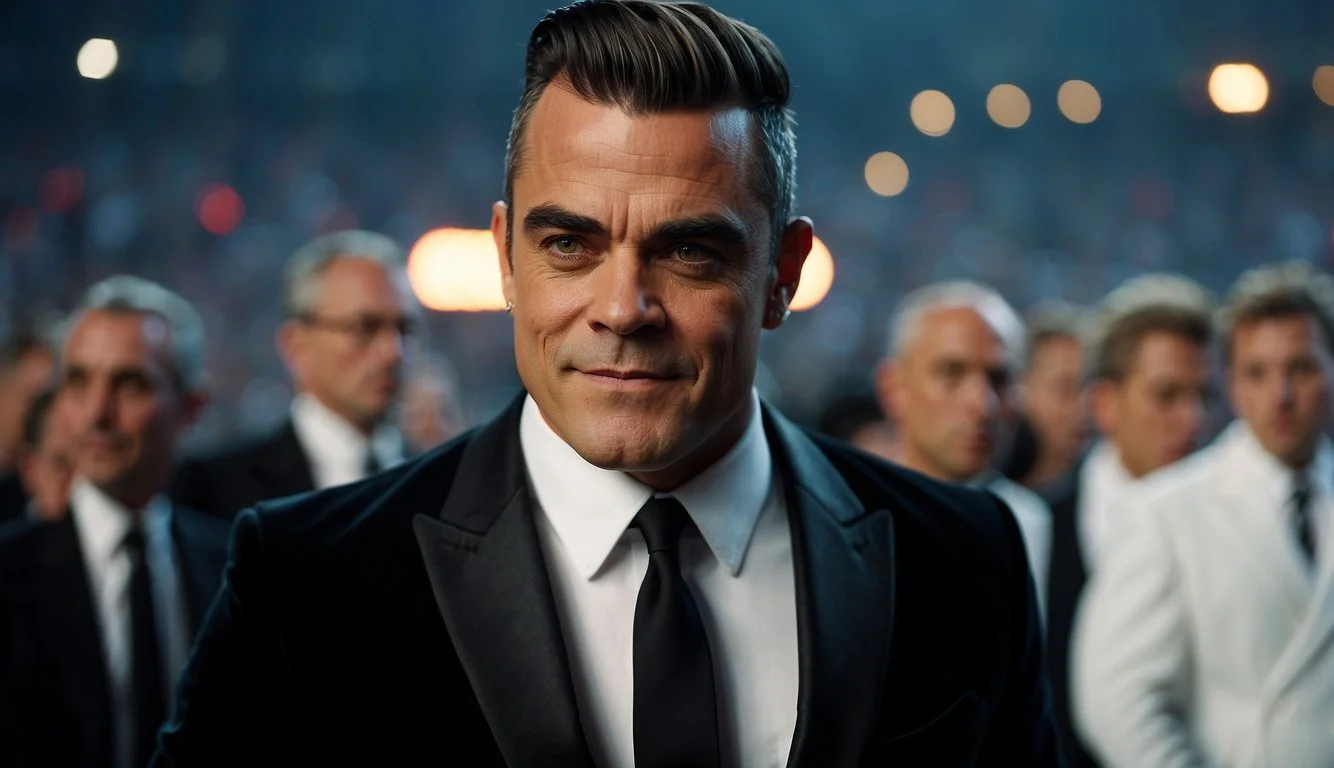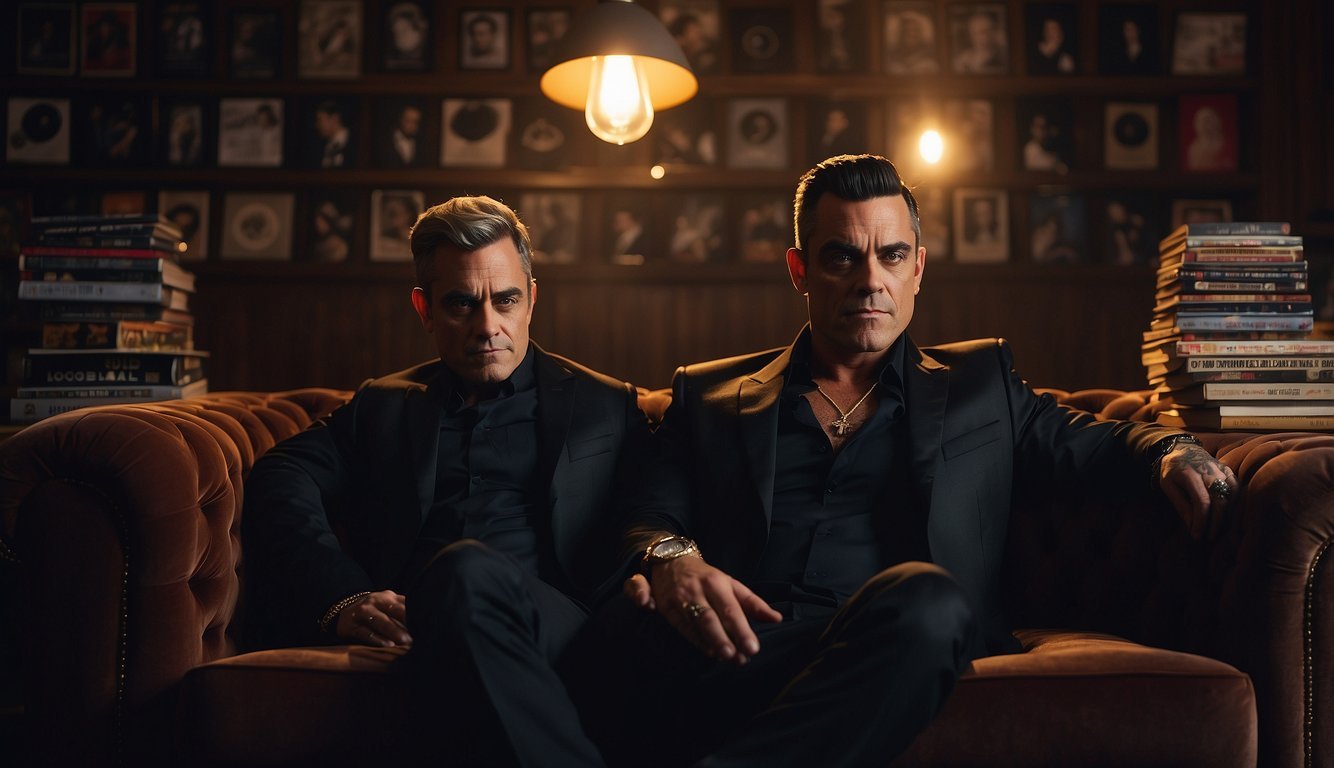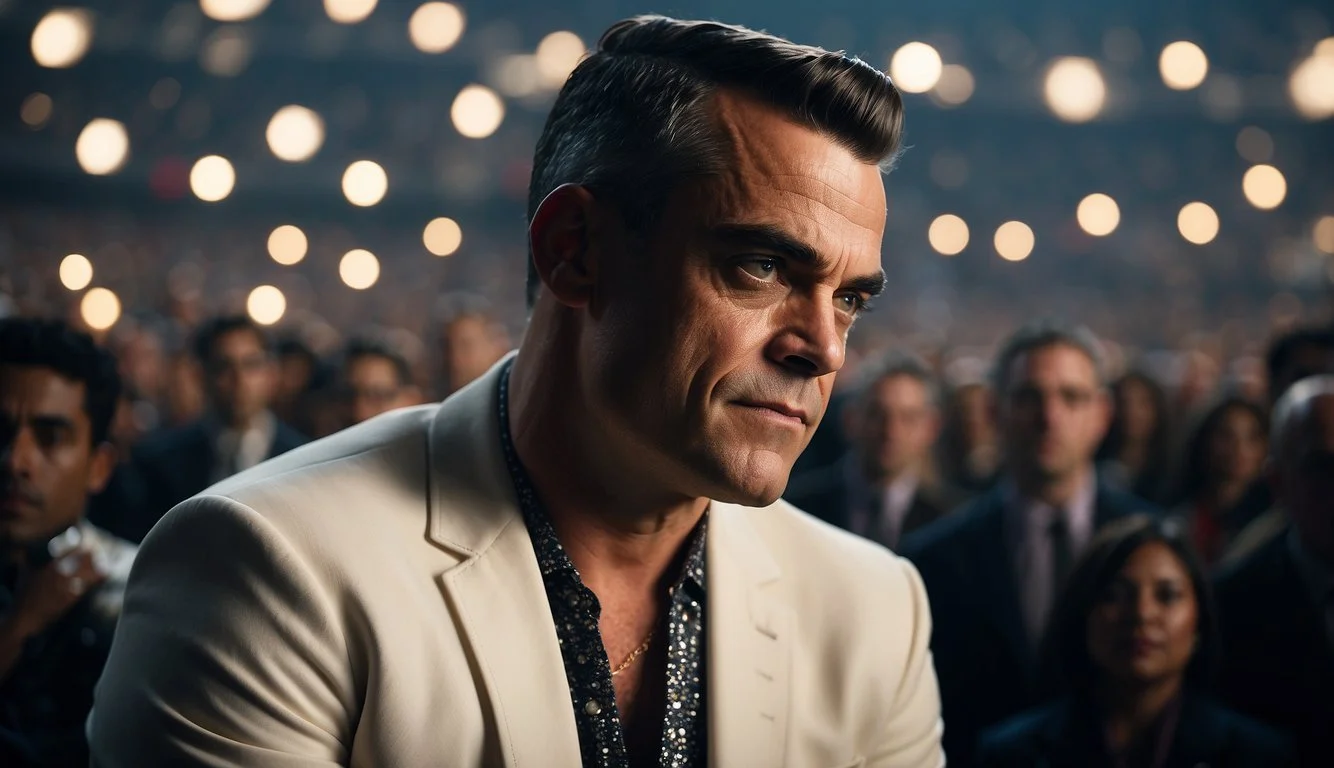Documentary Review: Robbie Williams (2023)
An In-Depth Analysis of the Pop Icon's Journey
The new Netflix documentary "Robbie Williams (2023)" offers an unfiltered look at the life of one of the world's most recognizable pop stars. Spanning four parts, the series delves into the triumphs and tribulations of Williams' career, offering fans an unprecedented glimpse into his highs and lows. Robbie Williams, known for his hit songs and charismatic stage presence, reveals aspects of his life that even his most devoted followers will find surprising.
One of the most striking aspects of the documentary is its honesty about the darker moments of Williams' life, highlighting the perils of pop stardom. From his rise to fame to his battles with mental health, the series does not shy away from the complexities of being in the limelight. This documentary serves as both a celebration of his achievements and a sobering reminder of the personal costs of fame.
Audiences will find the series both entertaining and deeply moving. With raw footage and candid interviews, "Robbie Williams (2023)" paints a complete picture of the man behind the music. For anyone interested in the true story of pop stardom, this documentary promises to be an eye-opening experience.
Background on Robbie Williams
Robbie Williams emerged as a pop sensation in the early 1990s as a member of the boy band Take That.
He was born on February 13, 1974, in Stoke-on-Trent, England. His charismatic stage presence and vocal talent quickly made him a standout member.
In 1995, Williams left Take That and began his solo career.
His debut solo album, "Life thru a Lens", released in 1997, included the hit single "Angels," which solidified his status as a major international artist.
Awards and Achievements:
Multiple BRIT Awards
Several MTV Europe Music Awards
Over 75 million records sold worldwide
Robbie's career has spanned over two decades, characterized by musical evolution and public highs and lows.
His ability to reinvent himself, from pop anthems to swing music, has kept him relevant in the ever-changing music industry.
Albums to Note:
I've Been Expecting You (1998)
Sing When You're Winning (2000)
Swing When You're Winning (2001)
Collaborations: Williams has worked with many artists including Kylie Minogue, Nicole Kidman, and more recently Guy Chambers, his long-term songwriting partner.
His life outside music, including his struggles with mental health and addiction, has been extensively covered by tabloids.
Despite numerous personal challenges, he remains a beloved figure in British music.
He continues to tour and produce music, captivating audiences with his enduring talent and unique personality.
Origins of the Documentary
The Robbie Williams documentary traces its roots back to the highly successful solo career of British pop star Robbie Williams. After departing from the boy band Take That, Williams launched a solo career that turned him into one of the best-selling artists in UK music history.
To commemorate over two decades in the spotlight, Robbie Williams was created as a four-part series. The documentary aims to present an intimate look at his journey, using reflections from Williams himself on his life and career.
Produced by Ridley Scott's RSA Films, the project features contributions from key figures in Williams' life. These include his longtime collaborator Guy Chambers, and his wife, Ayda Field. Their insights help paint a comprehensive picture of the icon's personal and professional experiences.
One key aspect of the documentary is its candid nature. Williams opens up about his struggles and triumphs, showing viewers sides of him that are rarely seen in public. This level of honesty distinguishes it from typical celebrity documentaries.
The timing of the documentary's release aligns with significant milestones in Williams' career, ensuring both nostalgia for long-time fans and context for newcomers. Ridley Scott's involvement also signals its high production value and cinematic quality.
By focusing on Williams' reflections and personal anecdotes, the documentary not only celebrates his achievements but also offers a deeper understanding of the man behind the music.
Documentary Synopsis
The documentary, titled Robbie Williams (2023), is a four-part limited series directed by Joe Pearlman. It offers an intimate look at the life of the English singer-songwriter, Robbie Williams. Known for his charismatic stage presence and profound impact on the music industry, Williams reflects on his journey in the spotlight.
Each episode delves into a different aspect of his career. Viewers get a glimpse of his rise to fame with Take That, his struggles as a solo artist, and his personal battles. The series brings forward interviews with close associates and unseen footage.
Prominent figures appearing in the documentary include Guy Chambers, Geri Horner, and Ayda Field. These individuals provide additional insights and anecdotes, enriching the narrative.
Robbie Williams, now 49, engages in candid discussions about his experiences. The series explores both his musical achievements and personal life. It provides viewers with an understanding of his challenges, triumphs, and reflections on his past actions.
The documentary is available for streaming on Netflix. It is suitable for a mature audience due to its candid content.
Production Overview
The documentary "Robbie Williams (2023)" provides viewers with an in-depth look into Williams' life and career through its stunning cinematography, well-curated music and soundtrack, and thoughtful direction and editing.
Cinematography
The cinematography in "Robbie Williams (2023)" captures both the grandeur of his performances and the intimacy of his personal moments. With a mix of concert footage, behind-the-scenes clips, and candid interviews, the film visually narrates his journey.
Wide-angle shots of his live shows highlight the energy and spectacle of his performances. In contrast, close-ups in personal interviews allow viewers to connect on a more emotional level. The use of natural lighting during personal scenes adds authenticity, enhancing the documentary's raw and genuine feel.
Music and Soundtrack
Music plays a pivotal role in this documentary, featuring a rich catalog of Williams' biggest hits and some lesser-known tracks. The soundtrack not only celebrates his musical achievements but also provides a nostalgic journey for long-time fans.
Live concert recordings are seamlessly woven with studio tracks, creating an engaging auditory experience. Key moments in Williams' career are underscored by thoughtfully selected songs, enhancing the emotional impact. The inclusion of background scores during personal interviews helps in setting the tone without overpowering the narrative.
Direction and Editing
The direction and editing in "Robbie Williams (2023)" are meticulously crafted to provide a structured yet fluid storytelling experience. The documentary is helmed by a director with a keen sense of pacing and narrative structure.
Transitions between past and present are handled smoothly, maintaining viewer engagement. The editing process ensures that each segment flows naturally into the next, whether it is a high-energy performance or a quiet moment of introspection. Personal anecdotes are strategically placed to offer insights without disrupting the overall rhythm. This balanced approach makes the documentary both informative and entertaining.
Themes and Messages
The documentary delves into themes of fame's impact on personal life. Robbie Williams opens up about the struggles he faced during his journey. His experiences illuminate the stark contrast between public persona and private battles.
Mental Health and Addiction:
A significant focus is on his mental health and addiction struggles. Williams candidly discusses his battles with substance abuse and depression. These personal revelations highlight the often unseen hardships behind his success.
Performance Anxiety:
Robbie Williams shares insights into his performance anxiety. Despite his on-stage confidence, he reveals the intense pressure and fear he grapples with. This theme underscores the complexities of life as a performer.
Identity and Reinvention:
The documentary explores his journey of self-discovery and reinvention. From his time in Take That to his solo career, Williams continuously redefines himself. This theme encourages viewers to reflect on their own paths of growth.
- Fame's impact on personal life
- Mental health and addiction
- Performance anxiety
- Identity and reinvention
Relationships and Support Systems:
Williams' relationships play a crucial role. The documentary highlights the support he receives from family and friends. These bonds provide a crucial foundation amidst the chaos of stardom.
These themes are presented through a mix of interviews, archival footage, and personal reflections. They offer a multifaceted view of Robbie Williams, providing a deeper understanding of the man behind the music.
Robbie Williams' Career Highlights
Robbie Williams began his musical journey as a member of the boy band Take That in the early 1990s. The group achieved immense success, with several chart-topping singles and albums.
In 1995, Williams decided to embark on a solo career, releasing his debut album Life Thru a Lens in 1997. The album included the hit single "Angels," which became one of his most famous songs.
His follow-up albums, I've Been Expecting You (1998) and Sing When You're Winning (2000), solidified his position as a leading solo artist. These albums featured hits like "Millennium" and "Rock DJ."
Awards and Recognition:
Brit Awards: Williams has won a record 18 Brit Awards, including Best British Male Artist multiple times.
Grammy Nominations: He received Grammy nominations for his global single "Kids" with Kylie Minogue.
Guinness World Records: He holds a record for selling 1.6 million tickets in one day for his 2006 World Tour.
Robbie's career saw continued success with albums like Escapology (2002) and Intensive Care (2005). He consistently sold out arenas worldwide, confirming his status as a significant live performer.
In 2010, Williams briefly reunited with Take That, resulting in the successful album Progress.
The Netflix documentary on Williams' life and career highlights his impact on the music industry and his enduring popularity.
From his boy band days to solo stardom, Robbie Williams remains a pivotal figure in pop music.
Critical Reception
The Robbie Williams documentary has garnered a variety of responses from both critics and the general audience. While it has received praise for its unflinching honesty, some have critiqued its execution and overall impact.
Professional Critics' Reviews
Professional critics have offered mixed reviews of the Robbie Williams documentary. NME rated the documentary four out of five stars, appreciating its raw portrayal of the singer's life and struggles, particularly its focus on mental health issues and media pressure. The Guardian and Decider also noted its compelling, unvarnished approach but highlighted mixed feelings about its execution, especially regarding its pacing and depth. Ridley Scott's RSA Films debut in unscripted production received attention, emphasizing the high expectations and varied critiques from the press.
Audience Response
The audience has been vocal about their reactions to the Robbie Williams documentary. Many fans appreciated the candid look into his life, especially those who followed his career from its inception. Online reviews highlight the emotional connection viewers felt, as they resonated with his personal and professional battles. Some viewers, however, found the documentary less engaging than expected, citing repetitive elements and a lack of new insights. The split in audience reception reflects the differing expectations and familiarity levels with Robbie Williams' history.
Awards and Nominations
The documentary's bold narrative and production quality haven’t gone unnoticed in the awards circuit. While not sweeping awards, it has been nominated for several categories in television and music documentary festivals. Specific nominations include Best Documentary Series and Best Biographical Documentary. The documentary's approach to sensitive subjects like mental health and the scrutiny of celebrity culture has been particularly acknowledged, sparking conversations about the pressures celebrities face in the modern media landscape. The industry recognition underscores the documentary's impact, despite the mixed critical and audience reviews.
Impact on Popular Culture
Robbie Williams has left an indelible mark on popular culture since he first rose to fame with Take That in the early 1990s. His transition from boy band member to solo artist showcased his versatility and mass appeal, making him a household name.
Many attribute his success to his ability to blend pop, rock, and swing genres seamlessly. This eclectic mix not only carved out a unique niche for him but also influenced future artists looking to diversify their styles.
His flamboyant stage presence and charismatic persona are trademarks that set him apart. Performances filled with energetic antics and heartfelt ballads created memorable experiences for audiences globally, contributing to his lasting appeal.
Williams' struggle with fame, mental health, and substance abuse has been openly discussed, making him a relatable figure. His vulnerability in sharing these personal battles has contributed to a broader conversation about the pressures of stardom, influencing public perception of celebrity culture.
The release of his documentary on Netflix further cements his impact by highlighting both his career highs and personal lows. Through the lens of director Joe Pearlman, audiences see a comprehensive portrayal of Williams' life and career, offering a deeper understanding of his influence on both the music industry and his fans.
Memorable Hits:
Angels
Rock DJ
Let Me Entertain You
These songs have become anthems, underscoring his ability to produce timeless music that resonates with multiple generations.
Robbie Williams continues to be a significant figure in music and popular culture, demonstrating the enduring power of his artistry and persona.
Personal Reflections of Robbie Williams
Robbie Williams presents an unfiltered and candid look at his life in this documentary. He’s seen in various states of undress, often in his pants or under his duvet, providing an intimate and raw glimpse into his daily existence.
This documentary highlights Williams' transition from being a member of Take That to becoming a successful solo artist. It emphasizes his impact on the cultural landscape of the 1990s and early 2000s.
Key Points:
Authenticity: Williams does not shy away from showing his vulnerabilities and personal struggles.
Career Highlights: From his boy band days to a solo career that saw massive hits and global tours.
Emotional Journey: Robbie’s reflections touch upon his high moments and deep lows. He candidly discusses the pressures of fame and his personal battles. This honest portrayal helps the audience connect with him beyond his public persona.
Production Quality: Produced by Ridley Scott’s RSA Films, the documentary benefits from high production standards, ensuring that Robbie's story is told in a visually engaging manner. This adds depth to the viewing experience, making it not just a personal recount but a compelling visual journey.
Overall, Robbie Williams’ reflections reveal the complexities of a life spent in the limelight, offering fans and viewers an unvarnished look at the man behind the music.
Conclusion and Future Implications
The Robbie Williams documentary offers an in-depth look at the life and career of one of the UK's most prominent pop icons. It highlights his transformation from a boy band member in Take That to a successful solo artist. Viewers gain insights into his personal struggles and triumphs.
In addition to personal anecdotes, the documentary uses previously unseen footage. This not only captivates fans but also provides a fresh perspective on his journey. Each episode builds a comprehensive picture of his multifaceted career.
Considering the documentary's positive reception, future projects could focus on similar deep dives into other major music icons. This could set a new standard for celebrity documentaries, blending personal insights with high production values.
The success of this documentary might encourage more collaborations with notable production companies. This approach can elevate the storytelling and bring unseen aspects of a celebrity's life to the forefront.
Those who enjoyed this series may anticipate follow-up projects or expanded content. Further releases could delve into specific phases of Williams’ career or explore other musicians in similar formats.
Key Points:
Insight into Robbie Williams' career
Combination of personal stories and exclusive footage
Potential new standards for celebrity documentaries
Collaboration opportunities with production companies
Anticipation for more in-depth content
Legal and Ethical Considerations
The documentary, Robbie Williams (2023), navigates several legal and ethical considerations pertinent to its production and distribution.
Informed Consent: A critical aspect is acquiring informed consent from all individuals featured. This documentary includes intimate footage and interviews, ensuring participants are fully aware of their involvement and its implications.
Privacy Rights: Respecting the privacy rights of Robbie Williams and those around him is crucial. This encompasses safeguarding against the disclosure of personal, sensitive information without explicit permission.
Intellectual Property: The use of music, archival footage, and other copyrighted material in the documentary demands proper licensing. Ensuring adherence to copyright laws protects the creators' rights and avoids potential legal disputes.
Representation and Bias: The portrayal of subjects must strive for accuracy and fairness. This includes avoiding misrepresentation through selective editing that might skew the audience’s perception of Robbie Williams.
Ethical Journalism: Upholding journalistic standards plays a pivotal role. It requires fact-checking and balancing the narrative to prevent sensationalism, thereby maintaining the documentary's integrity.
Mental Health Considerations: Addressing sensitive topics like mental health necessitates a compassionate approach. Ensuring that the content does not exploit or stigmatize is vital for ethical storytelling.
Ensuring these legal and ethical standards safeguards the documentary’s credibility and respects the rights of all involved.










